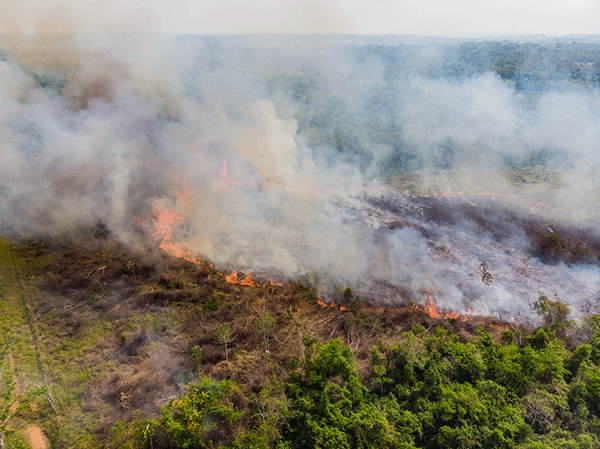Barclays, HSBC and NatWest are among a list of UK banks found to be linked to deforestation in Brazil through their funding portfolios, a new report has found.
The report, published by animal welfare charity World Animal Protection, found that the list of British banks and financial organisations, which also included Standard Chartered and Schroders, have investments totalling over $34 billion in companies linked to deforestation.
As a result, customers of these banks are unknowingly funding deforestation and knock-on effects such as climate change, biodiversity loss, human rights violations, and widespread animal cruelty, the report said.
It identified 60 companies that are likely to be contributing to deforestation in the Amazon and the Cerrado, a tropical savannah and critical ecosystem in Brazil, such as US food giant Cargill and JBS, the Brazilian meat company.
Researchers then analysed financial data from European banks and financial institutions, such as loans, bond underwriting, and shares in these high-risk companies, shedding new light on how these businesses are contributing to deforestation and other environmentally damaging practices.

Barclays and HSBC ranked second and third in all European financial institutions implicated, with investments worth $26.5 billion in 25 out of the 60 high risk companies.
“Customers of Barclays and HSBC will be devastated to learn that their pensions and savings are being invested in companies implicated in the destruction of the Amazon and Cerrado regions in Brazil,” said Lindsay Duncan, farming campaign manager at World Animal Protection.
The report has been welcomed by campaigners as building on growing awareness of the link between banks and deforestation.
Jo Blackman, head of forests policy at Global Witness, which first highlighted the issue in 2019, told Wicked Leeks: “We know from our own investigations that major UK banks are funding these destructive agribusinesses.
“Given the failure of voluntary commitments to resolve these issues, the UK government needs to act to stop UK finance fuelling global deforestation and associated human rights abuses.”
The impact of western consumer habits and supply chains on tropical ecosystems like the Amazon made headlines more recently, following a Greenpeace investigation that found supermarket and food brands using soy directly from deforested land in the Brazilian Cerrado in their chicken supply chain.
Greenpeace head of forestry, Anna Jones, said: “For banks to be investing in companies that are fuelling the climate and biodiversity crisis goes against everything we have learned over the last year about our health and future depending on nature being in balance. Banks must divest from climate wrecking companies immediately and without hesitation.”

More broadly, there is a growing awareness of the role of finance in ethical supply chains and empowering consumers to change this by switching banks or putting pressure on banks to change policy.
Vicki Hird, head of farming at sustainable food alliance Sustain, said: “With the rapidly growing tide of public awareness and action on this issue, how cheap meat from harmful production systems is harming the planet and society, demands for action by the finance sector and the food supply chain, will just get ever louder.”
Among other findings, the report by World Animal Protection found companies on the list that are heavily involved in Brazilian agriculture are the main recipients of UK bank financing, with loans and underwriting amounting to $7.23 billion.
The meat supply chain, both directly and indirectly through soy production for animal feed, is one of the principal drivers in deforestation in some parts of the Amazon and Cerrado.
In conclusion, and as a result of its primary interest in animal welfare, the report said the supply chains in the report “compound animal cruelty” and factory farming, and said a total rethink on the role of animals in food production is required to transform the food system and take pressure off land for deforestation.















I’ve been with Barclays since I was 16 as both my parents used to work for them in the 1990’s.
I think the time has come to find an ethical bank.
You have a particularly good reason to be loyal to your bank. I’m running out of reasons to stay with NatWest… they shut the branch in my villages, then the one in my nearest town, and now this.
I joined Triodos last year, the sustainable bank- they only finance projects that will have some sort of benefit for people or the environment – but I’ve kept NatWest as my safety net and haven’t fully committed to Triodos. But I agree Al73, the time has come for me as well to put them aside and use my power as a consumer to support a bank whose values align with my own.
This piece sums it up more eloquently that I can:
https://wickedleeks.riverford.co.uk/news/climate-change-environment-ethics-ethical-business/earth-day-switch-energy-and-bank
I bank with the Co-operative Bank and Triodos, because I want peace of mind about what my money is being used for
I am about to change to Triodos or the co-operative for ethical reasons, from Lloyds, after reading about banks, insurance companies and financial institutions, in the Ethical consumer magazine. Some of the leading high street banks also invest in other unethical activities, which I am sure if customers were aware, would be horrified, like I was when I found out. Ive already changed my house insurance, and my car insurance is next!! Worth a read. And thank you Wicked Leeks for highlighting it too!
Great that you have made the switch – it is a good feeling knowing that your money is being invested in positive change rather than propping up fossil fuel investments and supporting deforestation.